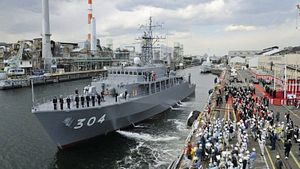Japan is considering dispatching Japan Maritime Self Defense Force (JMSDF) ships to safeguard the Strait of Hormuz in the Persian Gulf as part of a U.S.-proposed coalition to protect the strategically important waterway amid rising tensions between Iran and the United States over Tehran’s nuclear ambitions.
Senior politicians from Japan’s major political parties recently argued the pros and cons of sending Japanese warships to the Persian Gulf region during a televised debate, the Japan Times reported on July 14. The politicians concurred that the current situation in the Middle East does not require the immediate dispatch of JMSDF forces.
However, as Koichi Hagiuda, the executive acting secretary-general of the ruling Liberal Democratic Party, noted: “We can’t behave as if we are not an interested party. Cooperation with the international community is important. Some 80 percent of vessels transporting (oil) to Japan pass through the strait.”
The Japanese government has so far not publicly confirmed that the Trump administration requested Japanese participation in a U.S.-led deployment of allied and partner navies to the Persian Gulf.
Under Japanese legislation, the “Act of Punishment and Countermeasures against Piracy,” the JMSDF has been sending destroyers with Japan Coast Guard law enforcement officers aboard and P-3C patrol aircraft to the Gulf of Aden off Somalia since 2009. This law, however, only applies to actions against pirates and not foreign powers like Iran though.
While Japanese commentators and politicians have sketched out various scenarios under which a deployment of JMSDF forces is legally permitted, Japanese Prime Minister Shinzo stated that dispatching warships is permissible as part of the right to collective self-defense under a reinterpretation of article 9 of Japan’s pacifist constitution.
In past debates on Article 9, Abe repeatedly used the example of a hypothetical blockade of the Strait of Hormuz with sea mines necessitating the deployment of a JMSDF minesweeping flotilla.
The JMSDF’s current minesweeping fleet consists of over 20 ships — one of the largest in the world. In past decades, the JMSDF has gained a reputation as one of the most effective countermine naval force in the world.
“Japan deployed five minesweepers to the Persian Gulf in 1991 to remove 1,200 sea mines laid by the Iraqi military in the waters off Kuwait,” I wrote previously. “During the opening stages of the Korean War (1950 to 1951), Japanese minesweepers helped clear landing areas from mines for American troops and also were engaged in operations further away from the shores of the Korean Peninsula in the Sea of Japan.”
Abe is expected to announce a decision on the deployment of JMSDF ships for safeguarding the Strait of Hormuz following the July 21 Upper House elections. Any of Abe’s actions will be subject to parliamentary approval.

































